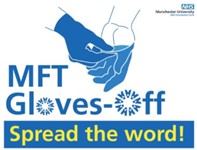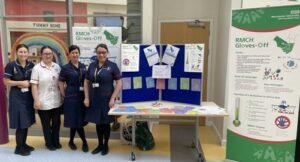Case study – Gloves-Off
Project: Gloves Off
Organisation: Manchester University NHS Foundation Trust
What was the issue?

At Manchester Foundation Trust (MFT), approximately 78 million non-sterile gloves are used and disposed of annually. When used in clinical settings, gloves are an essential component of Personal Protective Equipment (PPE) and are one of the most common items of single-use plastic within healthcare. The environmental burden of PPE is huge but can be reduced by optimising glove usage and waste management. When used inappropriately, gloves can be associated with poor hand hygiene and skin health, plastic waste, and health care associated infections (HCAIs). Additionally, there is evidence which highlights that patients can feel uncomfortable with inappropriate use of gloves during personal care.
What action was taken?
In August 2022, the Gloves Off campaign was launched at MFT by Lead Infection Prevention and Control nurses to highlight the problem related to inappropriate use of non-sterile gloves in patient care. The Royal Manchester Children’s Hospital specifically ran engagement activities with their in-patients to create campaign posters which focused on plastic waste in oceans and the negative impact on sea life from plastic pollution. As part of the campaign, clinical staff were reassured that hand hygiene measures are effective for protecting themselves against viruses to reduce glove use safely. By working with procurement teams, auditing glove use, and holding regular meetings specifically for Gloves Off, senior nurses were able to quantify reductions in use.
What was the Delivering a Net Zero NHS benefit?
Through 2022/2023, non-sterile glove use at MFT reduced by 14.6% which equates to over 11 million gloves or approximately 40 tonnes of plastic waste.
In terms of reducing the carbon footprint and financial cost of providing healthcare at MFT, the Gloves Off campaign has contributed to a reduction of 286 tonnes of CO2e and a financial saving of £14,000. Whilst this represents a very small part of MFT’s carbon footprint, this is a significant saving for one project.
What are the wider benefits?
Along with the carbon and financial savings, the project also led to a 0.4% reduction in total hospital waste (about 7,000 tonnes annually) and a 0.96% reduction in MFT’s clinical waste (approx. 3,000 tonnes).
The project has wider benefits in increasing staff and patient awareness of the contribution of healthcare to environmental degradation illustrating that we are part of the problem but have opportunities to be part of the solution too. It is also hoped that the project will enhance patient experience and increase safety by improving hand hygiene and decreasing the risk of healthcare associated infections.
Link for further information:
- More information: Glove awareness | Campaigns | Royal College of Nursing (rcn.org.uk)
- Resources: https://journals.sagepub.com/doi/pdf/10.1177/01410768211001583
Key contact and email: Lorraine Durham: Head of Nursing – Infection Prevention & Control/Tissue Viability – Lorraine.Durham@mft.nhs.uk
